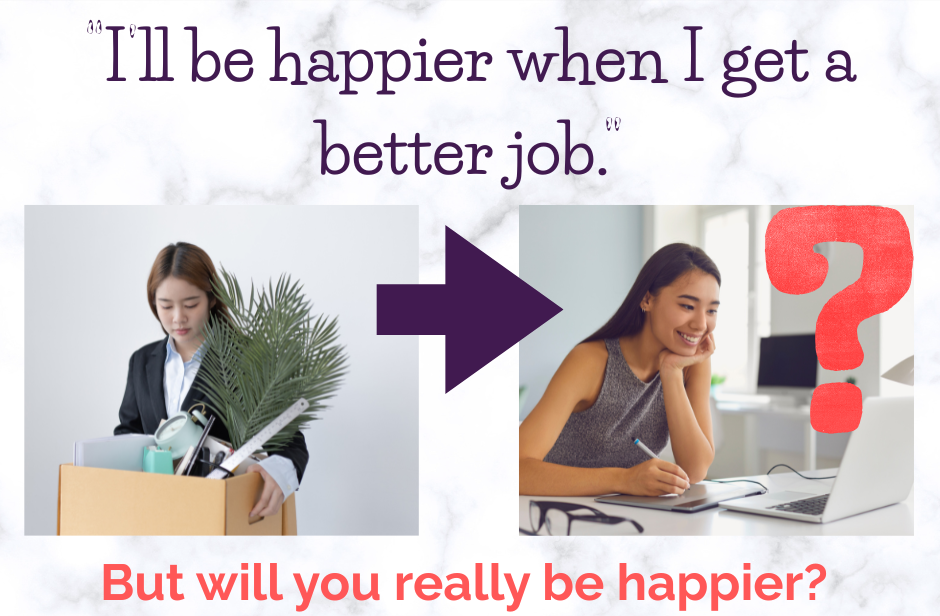Five Happiness Myths Destroying Your Happiness at Work
When I talk about happiness, people often argue that they cannot be happy nowadays because of the negative circumstances such as the difficult economic situation, the wars going on in the world, the inflation, the climate problems, the housing situation, the uncertainty of tomorrow, the salary levels do not follow inflation, etc. Their list of reasons they cannot be happy at work and in life is getting longer and longer every day.
Happiness is an enduring state of mind consisting of joy, contentment, and other positive emotions, as well as a sense of having a meaningful and valued life.
Sonja Lyubomirsky
Who is in charge of your state of mind? The world? The environment? Your family? No, it is you who should be in charge because you have control over your state of mind and intentional behaviours and actions. This means taking responsibility for your life, and don't let circumstances, other people or your past determine your happiness at work and in life.
What does research say about the factors determining our happiness? Research conducted by psychologist Sonja Lyubomirsky and colleagues' research results attribute about 50% of our happiness to genes, about 10% to circumstances, and about 40% to intentional actions. These percentages represent averages of participants in the studies, and individual influences might be slightly different.
Therefore, even if you are the worst pessimist in this world and live and work in the most miserable conditions, you could still increase your happiness by 40% if you maximise the impact of your intentional actions based on changes in your mindset, attitude, behaviour, skills, etc.
Our beliefs deeply influence our behaviours and actions. Some of these beliefs were created by repeatedly hearing and then repeating certain popular myths about happiness at work. According to Cognitive Behavioural Therapy, our thoughts influence our feelings, and both thoughts and emotions affect our behaviours and actions and therefore, our results. The beliefs we hold about happiness at work and ourselves at work, as thoughts we repeatedly and often unconsciously think, are the most important cause of not being happy at work, poor results, low performance, and not experiencing joy, satisfaction and fulfilment.
If you hold such negative beliefs about happiness at work, they can turn you into a perpetual happiness-chasing job-hopper. This doesn't mean you should never change jobs. It is normal to aim for a higher level and a more fulfilling job, as well as professional and career development. The problem is that if you are unhappy in your present job due to your beliefs or attitude, and the resulting behaviours and actions, you will be unhappy in your next job after the enthusiasm generated by its novelty fades away.

What are some of the most powerful myths about happiness that keep you unhappy at work?
- "The circumstances of your work determine your level of happiness." Many people believe that circumstances such as economic situation, inflation, taxes, salary, working conditions, job content, etc., determine their happiness at work. Undeniably, work circumstances have some influence on how satisfied, joyful and fulfilled you feel at work, but they are not the most important determining factors of happiness, as it is demonstrated by the research results presented above. What counts more are your mindset and attitude at work. If you are a negative person who always finds something to criticise, to grumble about, and nothing is good enough for you, the best working circumstances cannot make you happier. Salary also counts as an external circumstance. If you look up the relationship between salary and happiness on the internet, the first result you'll find claims that salary increases happiness up to a yearly income of 75.000 dollars. Another study, although less mentioned, has found that happiness continues to increase with salary growth. However, the relationship between happiness and salary is more intricate. Those who were happy with a lower salary experience an increase in happiness as their salary increases, while those who were unhappy with a lower salary see less impact of salary growth on their happiness.
- "You are happy when your working life is perfect, you are not stressed, there are no problems or challenges at work, and only good things happen to you, and you only experience positive emotions." If you think you need the world, your work and yourself to be perfect to experience happiness, you will never be happy because the perfect job, workplace or project does not exist. No person can live without experiencing some negative emotions. This belief about positive feelings and perfection creates unrealistic expectations on your part, such as "you must only have tasks that you enjoy and are exciting, interesting, creative, etc". Very probably, there is no such job that will provide you only with fulfilling tasks. There is always something boring, a few routine tasks to carry out, even if you are a solopreneur or entrepreneur who turned passion into a business. If you like most of your tasks, you must accept the additional ones as part of the whole. If you focus on what you don't like, you'll feel miserable at work. Learn to handle stress and cope with challenges. Reframe challenges as opportunities to grow. It is up to you to make your imperfect work a source of happiness and growth.
- "If you are a pessimist by nature, you cannot be happy." Remember that genetics only determines your level of happiness in about 50% proportion, and your intentional actions count for 40%. Even if you are the most pessimistic person in the world, you could still increase your happiness by about 40% by changing your mindset, negative beliefs, thought patterns and attitude, resulting in new behaviours and actions. Changing your mindset, attitude, behaviours, and actions is up to you; it doesn't depend on any external circumstances.
- "You'll be happy when you reach your professional goals, get a higher level or a more interesting job." When you focus on your future happiness brought about by an important achievement, you forget to live your life and enjoy each day. This doesn't mean you shouldn't set goals; they are very important, they give you direction, keep you motivated and focus your energy and actions. It means you should not attach your happiness to achieving a goal. Rather, enjoy the journey, be happy in the process and celebrate your everyday progress.
- "Work is for making a living, not to be happy." This belief stops you from assuming responsibility for your happiness at work and taking steps to make the necessary shifts to be happier. Work is an important part of life. We spend almost half of our awake time at work or with work-related activities. If you are unhappy at work and with your tasks, it has an important negative impact on your overall happiness. Has it happened to you that after a miserable day at work, you went home and poured your anger and frustration on your family, or you went out with friends and could not relax and enjoy their company? Decide that you want a happy life, and your work is a part of it, then take the necessary steps.
It is in your power to increase your happiness at work. Before you jump into a new job, reflect on why you are unhappy in your job and make the necessary changes. For example:
- Shift your mindset, attitude and approach to work.
- Analyse if your skills are aligned with the job requirements.
- Be more active in redesigning your job and getting involved in interesting projects at work.
- Improve relationships with your colleagues.
- Find meaning in your work and correlate it with your core values, life purpose and vision.
These are a few measures that can contribute to your happiness at work in the long term. If your state of mind is fine but you still feel uncomfortable with your job, you cannot find meaning in it, the job or company values are not align with your core values or your job doesn't support your life purpose or vision, it is time to look for a new job or maybe even a new career.

